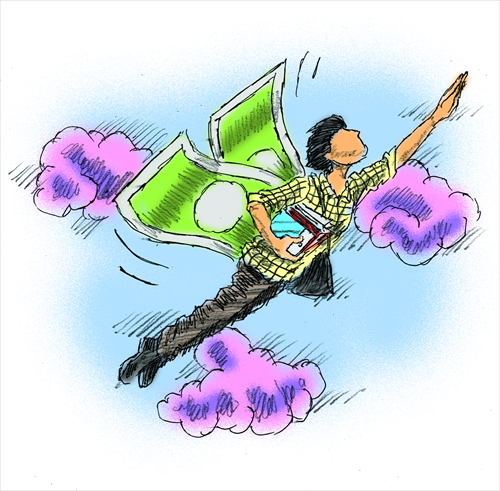HOME >> OP-ED
Chinese students in US get new look
By Rong Xiaoqing Source:Global Times Published: 2014-10-23 18:43:01

Illustration: Peter C. Espina/GT
Last week, a party at Lure, a nightclub in Los Angeles where Hollywood stars can often be spotted, attracted a lot of attention. The participants were not the usual familiar faces on the big screen. They were all young Chinese students or professionals.
You may not know who they are, but you can easily tell they are rich. They rented the whole venue exclusively for the party. A ticket costs $60 to $80. A balcony area for eight people costs $2,400. The VIP area for 10 people cost $3,200. All sold out. A red carpet was rolled out. The names of VIPs who paid the most were projected onto the Hollywood Walk of Fame through special lighting.
The party, which attracted more than 700 people, was hosted by Prime Union, a private elite society of young Chinese living in the US who are from upper-middle class families. For them, this wasn't a big expense. The members often travel together in private jets or exchange information on buying some of the most sought-after VIP tickets for concerts or sports events.
This may sound like one of the typical stories that appear frequently in the Chinese media these days - stories of rich Chinese kids gone wild or, at least, showing off their wealth, overseas. This public attention is not completely misplaced.
Young people from rich families sometimes cause serious trouble and disgrace themselves and their families. Only in the past month, two Chinese students in Boston and in upper state New York were arrested for speeding. Both of them drove luxury cars and didn't have valid driver's licenses. These echoed similar incidents in China and triggered another round of public criticism of spoiled rich kids.
But the tendency to scrutinize all rich kids and their activities from this angle is wrong. The existence of elite clubs like Prime Union reflects a new era of the Chinese student presence in the US, an era in which these young people are more visible in their host country and more confident of participating in American life.
The current wave of Chinese students studying in the US started with the reform and opening-up policy. But until the past few years, Chinese students in the US had been following a very similar route. Most of them spent all their free time on odd jobs to make money to pay the tuition. The lucky ones who got scholarships also had to pinch pennies.
They rarely had extra bucks for a meal in a modest restaurant, let alone for a visit to an expensive nightclub. They didn't even have the luxury to be able to study whatever interested them, but had to chase after degrees in computer science, accounting, or other subjects that could guarantee a well-paid job after graduation.
For a long time, the main goal for these young people was simply survival. In many ways, there was a line between the life of Chinese students and the life in the mainstream, which took at least a decade to cross.
And for the Americans, these hard-working but quiet young Chinese gained little attention.
Many of the new generation, thanks to their well-resourced families and their own determination to maintain their upper-middle class lifestyle, have both the will and the way to cross the line from the very beginning.
As a result, there are more Chinese students studying arts, movies, music and fashion in the US. More and more Chinese movies released in the US enjoy sold-out opening nights. The concert given by Chinese rock band Second Hand Rose on Sunday at New York's famous Webster Hall saw some young Chinese fly over from California just for the show.
This affluent generation seems to have no limits. They also go to high-end restaurants, fancy nightclubs, parades and festivals that used to see few Chinese faces. The events they host cater to people like themselves, born into "new money" but can also pull in some rich Americans and Europeans.
One of such events was the "Shanghai 1930" gala this summer. The event, organized by Trendy New York, a lifestyle consultancy founded by a young Chinese woman, May Lin, attracted hundreds of participants through Facebook and WeChat. The majority were young Chinese living in New York. But there were also young and fashionable Westerners.
Most dressed in qipao or three pieces suits as required by the host, and created a nostalgic atmosphere to recreate the glamour of 1930s Shanghai in the boutique Flatiron Hotel in Manhattan. The tickets of $50 to $100 were sold out quickly. And part of the income was donated to the One Foundation, founded by kung fu star Jet Li for children's welfare, disaster relief and philanthropy development in China. It looked like a lot of fun - in a good cause. And that is a credit to the heavily criticized rich young Chinese .
The author is a New York-based journalist. rong_xiaoqing@hotmail.com
Posted in: Columnists, Viewpoint